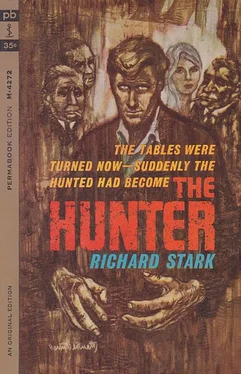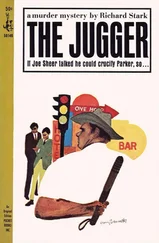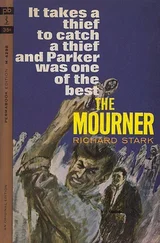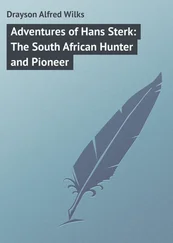Parker opened the lunch bucket and took the Luger out and showed it to them. “Take off your shirts,” he said. “Don’t reach under them.”
One started to do it, but the other one blinked and smiled and said, “What’s going on?”
Parker waited, ignoring the opening. The one who had started on the top button hesitated, looking at his partner. The partner’s smile flickered and he said, “I don’t know what you want, buddy. What’s the problem?”
“No problem,” Parker told him. “Take off your shirt.”
“But I don’t want to take off my shirt.”
“I’ll pull the trigger when the train starts,” Parker told him. “If you want noise before that, jump me.”
The hesitant one said, “The hell with it. Do like he says, Artie. What’s the percentages?”
Artie considered, and shrugged, and started unbuttoning his shirt. They took off their shirts and stood holding them in their hands. They each had two small revolvers tucked into their trousers, in under their belts.
Parker said, “Turn around.” They did so, and he reached around them, taking the guns away, putting them in the sink. Then he said, “Your train’s going to leave in a minute. Better hurry.”
They put their shirts back on wordlessly and left the room. Parker dropped the four guns in a water closet and went back outside. He walked along the train that was to leave next and saw the two cowboys with the man in the corduroy jacket. The three were sitting hunched together, talking. They looked up and watched him go by.
Down at the other end of the platform was the dispatcher’s building, tall and narrow. Beside it was a Coke machine, and a man in a business suit carrying a briefcase and holding a bottle of Coke. He’d been there when Parker had put his token in the turnstile, and he was still there. Parker hadn’t yet seen him drink any of the Coke. He was looking out toward the trains in the yards.
Parker walked the length of the platform and stopped by the Coke machine. He said, “You got change of a quarter?”
“Of course,” said the man. He put his bottle of warm Coke on top of the machine, switched the briefcase to his other hand, and reached into his trouser pocket.
Parker opened the lunch bucket and took the Luger out. His back was to the platform. He said, “Show me what’s in your briefcase.”
“Of course,” the man said again. He seemed unsurprised. He released the two straps and turned the flap back. He started to reach inside, and Parker shook his head. The man smiled and pulled the briefcase lips apart instead. There was a long-barreled .25 target pistol inside.
“Close it up again,” Parker said. The man did so. “Put it down beside the machine, and go get on your train.”
He watched as the man walked down the platform and got on the same car as the other three. A few minutes later, the conductor and the engineer clattered down the metal outside stair-case from the second floor of the dispatcher’s building and boarded the train.
The doors slid shut and the train pulled out. The lit sign switched, showing that the train on the other side was now next.
Half an hour later, at twenty past one, five more of them arrived, wearing flashy suits and carrying musical instrument cases. They got off their train and stood around laughing and talking loudly, and Parker waited for ten minutes by the Coke machine, wanting to be sure. When they still had made no move to leave, he was sure.
He went over and introduced himself and said, “You better hurry if you want to make your gig. Or you can make your play instead, right now.”
The other four looked at the one with the trombone case. That one looked at the train beside him, with the people on it, and the woman in the distant change booth, and the dispatcher’s building. Their car wasn’t outside yet, so they didn’t make their play.
At quarter to two, a woman got off a train and left an overnight bag on the platform bench. Parker caught up with her and gave her the bag back. She looked frightened when he handed it to her and hurried away toward the street.
When she left, Parker went into the phone booth on the platform and called Fairfax’s apartment. Fairfax answered, and Parker recognized the voice. He said, “I just got rid of the woman with the overnight bag. I haven’t killed any of these jokers yet, but the next one I will. And if the money doesn’t show, I’ll come back for you.”
Fairfax said, “Just a moment.” The line hummed for a little, and then Fairfax came back on. “It’ll be a little late.”
“That’s all right,” said Parker.
There weren’t any more of them. At twenty to three, a train pulled in and two men got off it together, one carrying a suitcase. They came over to Parker, sitting on the bench, and put the suitcase down on the bench beside him. They started away again, without a word, but Parker said, “Wait.”
They turned around and he motioned at the suitcase. “Open it.”
They looked at each other and licked their lips. They didn’t know if it was bugged or not. Finally, one of them opened the two catches and lifted the top. There was nothing inside but money.
They sighed with relief, and Parker said, “Fine. Close it again.” They did so, and walked away down the platform and through the exit and out to the street.
There were three ways away from here. There was the subway. There was the bus that came in at the end of the platform by the turnstiles, free transfer from and to the subway. There was the exit and the walk to the street. They would be ready for him whichever way he went.
He walked down by the Coke machine and set the suitcase down. He transferred the Luger from the lunch bucket to his side pants pocket and the target pistol from the briefcase to under his belt by the right hip pocket. He still had Mr. Carter’s pistol, and this he held in his left hand.
He picked up the suitcase again, walked to the outer end of the platform and down the steps past the sign saying TRANSIT EMPLOYEES ONLY. There was a wooden strip raised over the third rail.
Parker stepped carefully over this and over the track and toward the yards. It was dark out here and no one paid any attention to him.
He moved carefully across the yard, stepping high over each third rail, not wanting even to touch the wooden cover, and finally got past them all to a wide grass-grown gravel driveway. There was more light here, along the driveway, and he walked carefully, keeping to the darkest side. Glenwood Road was ahead, with cars parked along it and the row of houses stretching away down the cross streets. He couldn’t see if there was anyone in the cars.
The driveway went through an opening in the fence around the yard. Parker paused at the fence, watched, listened, then stepped through and turned left, away from Rockaway Parkway and the subway entrance. The suitcase was heavy in his right hand, the pistol comforting in his left, held close against his side.
He crossed the street, because three colored boys were walking in his direction on this side, wearing raincoats and porkpie hats and singing in falsetto. He went on down two blocks and turned right where the project began, and tossed Mr. Carter’s gun into a litter basket. Whoever fished it out in this neighbor-hood, it would be a long while before it got to the law.
He transferred the suitcase to his left hand, and walked along with his right hand close to the Luger in his pants pocket. A car squealed around the corner behind him, headed his way.
There was a bulldozed field to his right, where the row houses hadn’t been put in yet. He ducked across that, pulling the Luger out of his pocket, and somebody in the car fired too early. He dropped to the ground, and the car raced on, screaming around the far corner and away.
Читать дальше












